In recent ethnographic case studies conducted by Anglia Ruskin University and documented in the report titled "Detailed Case Study Ethnographic Notes," researchers investigated the impact of digital innovation on manufacturing companies navigating Industry 5.0’s unique challenges and opportunities.

Through the lens of technological change, the report underscores how digital advancements reshape the roles and skills required within manufacturing environments. Contrary to some common assumptions, the studies reveal that the true pressure point for adopting these innovations successfully lies not within the workforce but within the management's preparedness and adaptability.
The companies studied each face unique challenges and employ diverse strategies in their approach to digital transformation. A central theme emerges across all cases: the need for managers to adopt a human-centred approach, valuing and nurturing the existing skills within their workforce, rather than defaulting to a technology-centred mindset that risks sidelining human expertise and craftsmanship. Instead of seeing technology adoption as purely a tool for operational efficiency, these studies suggest that the most effective outcomes emerge when managers themselves receive training to understand, evaluate, and implement new technologies thoughtfully and inclusively.
Balancing Technology with Craftsmanship
Across the companies studied, managers face a complex balancing act — preserving traditional craftsmanship while integrating advanced technologies to improve productivity. For instance, one large-scale manufacturer, introduced sophisticated digital tools to streamline its processes, maintaining rigorous quality standards for a new product line. While these technologies were instrumental in meeting the evolving market demands, they required managers to reevaluate how they viewed their workforce — not as replaceable parts in a machine but as valuable sources of innovation, with insights essential to fully realising these technologies' potential. In this context, managerial training in change management and effective communication was highlighted as crucial for fostering an environment where workers felt their skills and input were valued, rather than merely treated as operational costs.

The Essential Role of Managerial Training and Adaptation
While digital tools are often introduced under the assumption that they will simplify or replace labour, these case studies reveal that the key to successful implementation lies in preparing managers with the right skills and mindset. At a medium-sized enterprise specialising in high-end products, management took steps to implement lean production models and integrate new machinery to enhance efficiency. However, they faced challenges in maintaining the artisanal quality of their products — a core aspect of the company's identity. Training managers in transversal skills, such as fostering psychological safety and developing an entrepreneurial mindset, proved critical. This allowed them to lead their teams effectively through the changes, prioritising a human-centred approach that recognised the complexity and creativity involved in skilled labour.

Another challenge surfaced in smaller, artisan-focused companies. Here, the concern centred not only on preserving traditional craftsmanship but also on carefully assessing how digital tools might affect product quality. For some of these companies, the decision to invest in digital technologies was measured, and managers prioritised gradual, incremental improvements over sweeping changes. This cautious approach underscored the need for manager training in understanding the existing workforce's tacit skills and knowledge—often acquired over years and essential for maintaining product quality in niche markets.
Building Collaborative and Adaptive Management Practices
The ethnographic studies reveal that the most forward-thinking companies do not simply adopt new technologies; they build cultures of collaboration and adaptability. At a high-end product manufacturer, managers are actively working to involve workers in decision-making processes to ensure a smoother adoption of new technologies. The introduction of a feedback culture and symmetrical communication practices allows employees at all levels to contribute to the change process, thereby reducing resistance and enhancing collaboration. However, researchers noted that this approach was largely contingent on the managers’ own training and openness to adapt. When managers received structured training in both feedback culture and collaborative communication, they were better positioned to lead change effectively, benefiting from the collective expertise of their workforce rather than relying solely on abstract technological promises.
Training Needs for Managers in Technology-Driven Environments
The case studies consistently demonstrated that the real training need lies with managers, not frontline workers. While workers benefit from programs designed to help them adapt to new digital tools, it is the managers who require in-depth, targeted training to foster an environment conducive to successful technology adoption. Training recommendations for managers fall into several key areas:
- Project and Change Management: Research highlighted the need for skills in advanced project management and change management, emphasising a balanced approach between universal systems and tailored adaptations that consider the organisation’s specific history and machine ecology.
- Culture Building and Psychological Safety: Managers need to foster a culture of psychological safety to support the organisation’s long-term strategies. Training in high-performance management systems can help managers create environments where innovation thrives, and employees feel secure contributing ideas.
- Communication and Feedback: The case studies demonstrated a clear need for managers to develop effective communication practices. Training managers to build a feedback-rich environment encourages open dialogue and continuous improvement, facilitating the adoption of complex digital tools.
- Transversal and Soft Skills: Companies with a traditional craft focus highlighted the importance of transversal skills, critical thinking, and an entrepreneurial mindset. Managers trained in these areas are better prepared to navigate the nuances of integrating new technologies without compromising quality.
- Strategic HR and Workforce Development: Managers often have the dual responsibility of recruiting, retaining, and upskilling workers while implementing advanced tools. Providing training in basic HR skills can empower managers to foster a well-rounded, adaptable workforce, critical to the success of Industry 5.0 transformations.

Conclusion: A Shift in Managerial Mindset for Industry 5.0 Success
The ethnographic insights reveal that a successful transition to Industry 5.0 in manufacturing relies not just on adopting new technologies but on equipping managers with the skills to understand, support, and collaborate with their workforce. Managers play a pivotal role in aligning technological changes with the company’s craftsmanship values and long-term goals. By investing in managerial training and emphasising human-centred practices, companies can achieve a balance between digital innovation and traditional skills. This approach helps preserve product quality, maintain a collaborative workplace culture, and strengthen the company’s competitive edge, positioning them for success in a rapidly evolving market.